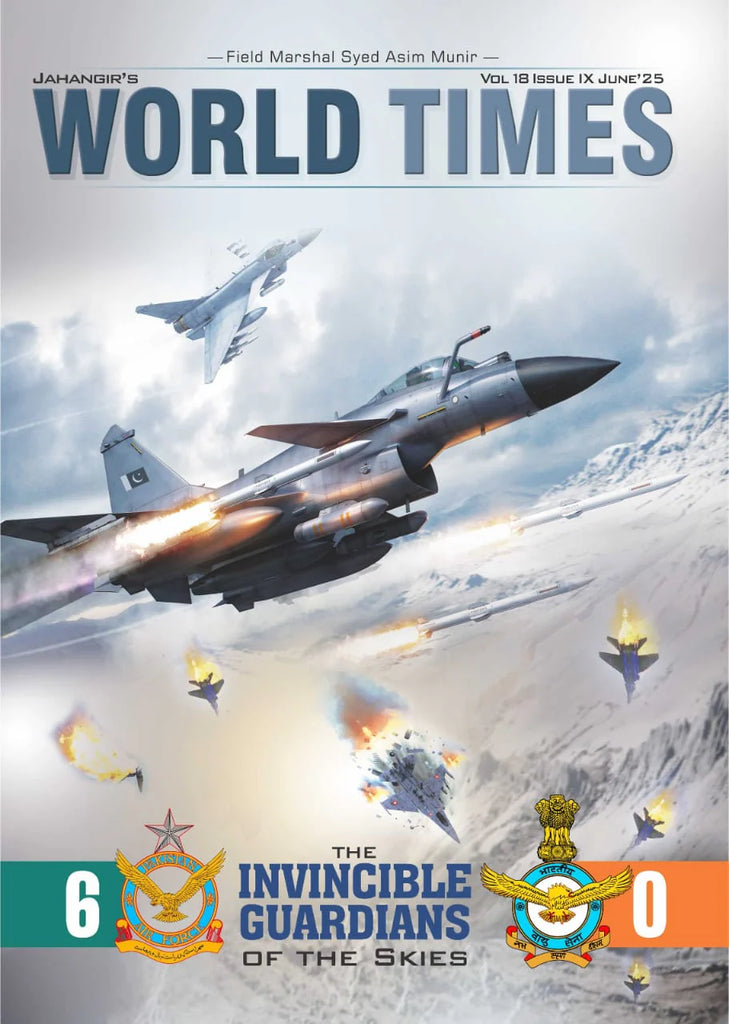Jahangir's World Times - First Comprehensive Monthly Magazine (June 20
Best For Competitive Exams (CSS,PMS,PCS & All Descriptive Exams)
EDITORIAL
Pakistan’s Resounding Victory
Real test begins now!
It is now as clear as day that the principal cause of the recent tensions between Pakistan and India was the war hysteria created by the Indian government and its state-controlled media following the Pulwama incident. Immediately after the incident, India held Pakistan responsible without even a preliminary investigation or inquiry, and announced several harsh, unwise actions, including the suspension of the decades-old Indus Water Treaty. These reckless and belligerent measures created an environment or war between two nuclear-armed nations, making it inevitable for Pakistan to give a befitting response to the Indian aggression.
Had Pakistan not responded, the balance of power in the region would have titled in India’s favour, putting both South Asian and global peace at risk. this concern was recognized at the international level as well prompting countries like the United State and Saudi Arabia to step in as Mediators. However, due to India’s stubbomness, all reconciliation efforts proved fruitless, leading Pakistan to launch Operation Bunyaan al Marsoos. Under this comprehensive plan, intense strikes were carried out in various Indian cities, causing significant damage to their air bases and other military installations.
Indian leadership came to its senses only after it received a crushing response from Pakistan. The Modi government, then, rushed to seek help from the United States to arrange a ceasefire. It was only upon India’ request that President Trump intervened. Pakistan, acting responsibly and in line with international norms, agreed to the ceasefire, as we believe that escalation in the region benefits on one. It is now a shared responsibility of both nations to maintain this ceasefire. However, India’s past record on respecting ceasefire along the Line of Control (LoC) is not very encouraging.
As for Pakistna, the tremendous success on the battlefield is indeed exemplary; the test now begins for the country’s political leadership. This war has somewhat set India back on both the South Asian and global fronts. Its dream of regional dominance and the concept of ‘Akhand Bharat’ have suffered a deadly blow. And to the Indian government’s chagrin, the Kashmir issue has once again emerged prominently on the international stage.
So, it is for our leadership to demonstrate significant diplomatic acumen and sagacity to bring India to the negotiating table and achieve meaningful outcomes. Since President Trump has expressed his willingness to play a role in resolving the Kashmir issue, Pakistan should give him credit for the ceasefire and encourage the U.S. to play an active and effective role in this matter. In line with President Trump's tweet, Pakistan should ensure that issues such as Kashmir, the Indus Waters Treaty, and India's involvement in terrorism in Balochistan and Khyber Pakhtunkhwa are included in the negotiation agenda and work toward their resolution.
It can be hoped that just as President Trump facilitated the ceasefire, he will also bring both countries to the negotiating table and ask them work towards resolving these disputes-seeking to add another diplomatic success to his record.
We must remain hopeful that the leadership of both nations will seize this opportunity and, by showing wisdom, insight, and prudence, contribute to the promotion of peace and development in their respective countries. In this regard, the United States, the United Nations, and other global powers must play an active and effective role in finding a sustainable solution to the Kashmir issue, the Indus Waters Treaty, and terrorism so that lasting peace can be established in South Asia, and the two nuclear powers of the region do not become a future threat to global peace through war.
Adeel Niaz
adeelniaz78@gmail.com
Facebook.com/AdeelNiazJWT
CONTENTS
GENERAL
From the Editor’s Desk
Letters to the Editor
Wettest and Driest Countries
The Silent Strength
Vietnam War
Building Pakistan’s Future
The Cultural War
INTERNATIONAL
Trump-China Tariff War
Shift from Globalism to Regionalism
The Changing World Order
Fixing the Global Digital Divide
US Foreign Policy
How AI is Reshaping Literature
The New Trade War
NATIONAL
Crime Control and Policing
From Pahalgam to Ceasefire
Pakistan-India Strategic Standoff
National Spirit
Environmental Conditions
Talent and Economic Development
GK CORNER
Pakistan’s Major Anti-terror Operations
India-Pakistan Strife
Inventions that Changed the World
The Largest Exporters in the World
Earth’s Complete Blackout
10 Technology Trends
World in Focus
EXAM PACK
Preparing for CSS Interviews
CSS Interview Tips
Essay Strategy for CSS
The Bandung Conference
Ethnocentrism
Blueprint for Space Sustainability
The Crisis of Capitalism
Word Bank
INTERVIEWS
Siffat Ullah
25th in Pakistna; CSS 2023-24
Kinza Iftikhar
Inspector Federal Board of Revenue
Pakistan's Challenges and Our Youth
Recent tensions between Pakistan and India have again brought Pakistan at a critical juncture. One the one side, India seems hell bent on going all-out against Pakistan just to keep Modi's vote bank intact while India-supported terrorism in Balochistan is also rearing its ugly head, on the other. In these challenging times, there is a pressing need to make our youth, which are the future stakeholders of the country, aware of the nefarious designs of our enemy. Pakistan benefits from having a youthful and energetic population, with more than 64% of its people under 30. And, when these young people are informed, empowered and actively involved in building national resilience, this demographic dividend will surely turn into a strategic advantage. They must be made aware that in today's modem world, battlefield transcends national boundaries, as hybrid warfare, information warfare, psychological disruptions and internal destabilization, which frequently precede or accompany physical strikes, are the norm of the day. Pakistan's youth must emerge with clarity and purpose at this crucial moment when regional peace is at stake. Now is not the moment for distraction or indifference. Now is the moment for reflection, readiness and solidarity. Your decisions count, whether you are a student in Lahore, a tech worker in Islamabad, a medical student in Gilgit, or the son of a farmer in Balochistan. You contribute to Pakistan's national defense.
Salma Ghani, Chakwal
Promoting Solar Energy
Pakistan's energy landscape has undergone significant changes in recent years, driven by the government's efforts to diversify the energy mix and promote renewable energy sources. Solar energy is one such source. What once felt like a niche or long-term goal is now becoming a practical solution for households, industries, and even the government driven by a mix of incentives, falling costs and a growing awareness of climate change. That is why promoting the use of solar energy, which has been quietly yet steadily transforming Pakistan's energy mix over the past few years, is now the centre of the government's efforts. The government has set ambitious targets for renewable energy, aiming to achieve 60 per cent of its generation capacity through indigenous clean energy technologies by 2030. With the right policies and financing options in place, solar energy has the potential to drive sustainable development in Pakistan, reducing the country's reliance on imported fossil fuels and mitigating the impacts of climate change. As Pakistan continues to harness the power of the sun, it is likely to play an increasingly important role in the country's energy mix, paving the way for a cleaner, greener, and more sustainable future for generations to come.
Amjad Afridi, Swat
Melting Glaciers
With nearly 10,000 glaciers retreating at an alarming pace due to rising global temperatures, Pakistan is facing an unprecedented environmental threat. This retreat has led to the formation of 3,044 glacial lakes, 33 of which have been classified as highly volatile and the latter group poses an immediate danger to the 7.1 million people living downstream. A coordinated national response is required to surmount this challenge. The government must begin by identifying and mapping all high-risk glacial lakes and downstream communities. Early warning systems, evacuation routes and disaster training must be deployed across all vulnerable districts. In parallel, a glacial monitoring system with real-time data-needs to be established in coordination with international climate and research institutions. Just as Importantly, new development in risk-prone areas must be halted immediately. Pakistan must also strengthen its voice in International climate diplomacy. It contributes less than 1% to global emissions yet faces some of the worst consequences of climate change. This imbalance must be the core of its external funding outreach. We deserve both financial and technical support from high-emission nations to protect its fragile mountain ecosystems and safeguard millions of lives.
Afrasiab Khan, Astore
AI for Agriculture
In today's age of artificial intelligence, the world is reaping great benefits from this novel technology. For Pakistan, the integration of Al into agriculture holds immense potential to revolutionize farming practices. It can be very helpful for farmers to predict weather changes, optimize irrigation, detect crop diseases early, and make data-driven decisions to protect their harvests. However, most Pakistani farmers are unaware of Al's benefits or lack the necessary training to operate such technologies. Deep-rooted traditional practices further slow the adoption of Al at the field level. Environmental and regional suitability issues also arise, as Al models designed for other regions may not directly address challenges like water scarcity and extreme heat, without costly customization. To overcome these barriers, stakeholders must prioritize improving rural infrastructure, subsidizing Al tools, and launching farmer-centric training programs. Policymakers should collaborate with tech firms to develop affordable, region-specific solutions, while awareness campaigns led by local influencers could build trust.
Sirajuddin, Larkana

